It is an unnerving surreal scene in the documentary “Oscar’s Cuba” when supporters of the Cuban government shout “down with human rights” to intimidate defenders of opposition leader Dr. Oscar Elias Biscet. And more colorfully and unambiguously, the crowd bellows “we sh _ _ on human rights!”
How can individuals and governments hold such a condemning view on human rights? As Americans we demand our rights; we admire the struggles of peoples everywhere claiming their rights; we worship the unalienable rights of life, liberty, and the pursuit of happiness proclaimed in our Declaration of Independence. Collectivists, however, see rights differently, so where do rights come from?
|
|
Are rights man- made, the social creation of a particular vision of society as Marxists claim? Or, are rights a self evident endowment of our Creator as Jefferson asserted? The question of whether rights are creations of particular societies, or independent of them, is fundamental to our stance on standards of moral conduct and political organization.
There are three principal epistemological traditions on the origin of human rights: (1) Rights are moral laws and they come from God. (2) Rights are political laws and they are created by governments. (3) Rights are moral laws inherent in man’s nature.
If human rights are simply a creation of the human intellect it is very difficult to argue that they are universal and that every government is obligated to honor rights they disagree with. Accordingly, Karl Marx denounced rights as a fabrication of bourgeois society. Moreover, if rights are no more than a whimsical invention of government, they can be revoked at the pleasure of the government; they are permissions, not rights.
On the other hand, if rights emanate from God and exist prior to, and distinctly from, any man-made law, they cannot be granted or repealed by government fiat. Unfortunately, no divine origin for human rights can be judiciously advanced since there is no evidence of such divinity, much less evidence of the existence of rights that demonstrably emanate from God.
An additional problem is that there is not one God that is universally recognized and thus we are left to decide if it is the moral code of Yahweh, Allah, or Brahman that should prevail. To anchor rights on a divinity is to admit that there is no evidence to support the existence of universal human rights.
Very much aware of these issues, Enlightenment thinkers, and the Founding Fathers sought to anchor human rights in nature as a matter of natural law. But, in seeking to extrapolate rights from nature, liberal thinkers filled their arguments with references to what God had ordained, or granted. John Locke posited his “law of nature” linked to “men being all the workmanship on one omnipotent, and infinitely wise maker.” And Jefferson noted that the moral law of nature is “the moral law to which man has been subjected by his Creator.”
These classical expositions of natural law retain the philosophical problem that if natural rights come from God, then proof of their existence depends on proof of God’s existence. To address this, modern thinkers have developed a number of more secular natural rights theories that do not originate with a Divinity. But it is this genre of issues that have led some philosophers to mock belief in human rights as “one with belief in witches and unicorns” (Alasdair MacIntyre) or “nonsense upon stilts” (Jeremy Bentham).
The United Nations Declaration of Human Rights declares that human rights flow from “the inherent dignity of the human person.” This too can be a problematic concept as no universal agreement can be reached as to what is needed for a life of dignity. Some will claim that a vacation home on the beach is an absolute necessity for a life worthy of a human being, others require multiple consorts. Who is to tell?
Totalitarian regimes take advantage of this philosophical quandary to subordinate the individual to the state. Since governments hold a legal monopoly on the use of physical force, we need individual rights to protect ourselves from the involuntary servitude to others demanded by collectivism.
Our best intellectual argument is that each individual is morally an end in himself/herself and not a means to the ends of others. This means that individual rights are our defense against collectivism. Individual rights may, or may not be, God given, or inherent, according to our personal beliefs. Human rights may just be an aspiration or an artifact, but in a social context, they are what we require to live in freedom.
Please let us know if you  this article. this article. |
|
We welcome your feedback.
Abrazos,
Lily & José
(click on the name to email Lily or Jose) |
|
This article was originally published in English in the Miami Herald and in Spanish in El Nuevo Herald.
|
|
|
|
|






No comments:
Post a Comment